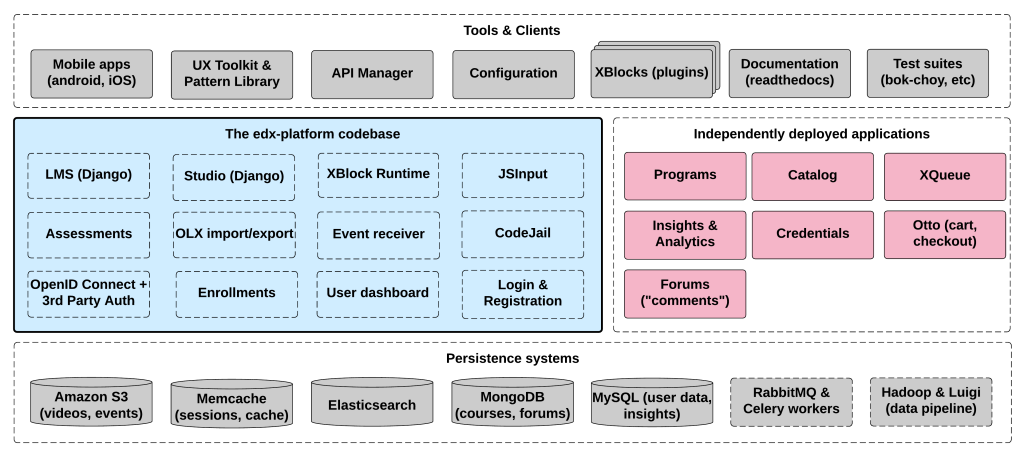What is Open edX and how does it work?
Open edX is an open-source online learning platform that allows organizations to create and deliver interactive and engaging courses to learners worldwide. It was originally developed by edX, a non-profit organization founded by Harvard University and MIT, and is now supported by a global community of contributors.
Open edX provides a comprehensive set of tools and features for creating and managing online courses. Here’s how it works:
Course Creation:
Educators and instructional designers can use the Open edX platform to create courses by organizing content into modules and units. They can create different types of learning materials, such as text, videos, quizzes, and assignments, to engage learners.
Course Management:
Open edX offers a user-friendly interface for managing courses. Educators can set up prerequisites, define course schedules, and control access to course content. They can also track learner progress and performance through built-in analytics and reporting tools.
Learner Interaction:
Open edX provides a collaborative learning environment where learners can interact with course content and each other. They can participate in discussion forums, collaborate on group projects, and receive feedback from instructors and peers.
Assessments and Grading:
Educators can create assessments, including quizzes and exams, to evaluate learner understanding and progress. Open edX offers a variety of question types and grading options to support different assessment approaches.
Certifications and Credentials:
Open edX allows organizations to issue certificates and digital badges to learners upon successful completion of courses or specific milestones. These credentials can be customized and personalized to recognize learner achievements.
Customization and Extensibility:
Open edX is highly customizable, allowing organizations to brand their online learning platform and tailor it to their specific needs. It also supports integration with external tools, such as learning management systems (LMS), video conferencing platforms, and content repositories.
Open-Source Community:
Open edX is built on open-source technologies, which means that the platform’s source code is freely available for anyone to use, modify, and contribute to. The global community of developers and educators continually enhances and extends the platform’s capabilities.
Scalability and Accessibility:
Open edX is designed to handle a large number of learners simultaneously. It supports scalability through cloud-based deployments and can accommodate organizations with thousands or even millions of learners. The platform also adheres to accessibility standards, ensuring that learners with disabilities can access and engage with the course content.
Overall, Open edX provides a flexible and powerful platform for creating and delivering online courses. Its open-source nature, rich feature set, and active community make it a popular choice for educational institutions, corporations, and individual educators looking to offer high-quality online learning experiences.
How does Open edX work?

Open edX Studio is the side of the platform accessed through a browser by course administrators, instructors, and course authors. This is where you can create, design, and manage your courses.
Open edX is an open-source online learning platform that enables organizations and institutions to create and deliver interactive courses to learners worldwide. Here’s a high-level overview of how Open edX works:
Architecture: Open edX is built on a distributed architecture that consists of several components. The main components include the Learning Management System (LMS), which handles course delivery and learner interaction, and the Content Management System (CMS), which is used for course authoring and content management. These components work together to provide a seamless learning experience.
Course Creation: With Open edX, course creators and instructors can develop engaging and interactive courses using the CMS. They can organize course content into modules and units, add multimedia elements, create assessments and quizzes, and set up discussion forums. The CMS provides a user-friendly interface for content creation and management.
Learner Interaction: Learners access courses through the LMS, which provides a learner-facing interface. They can enroll in courses, navigate through course modules, view instructional content, and interact with learning activities. The LMS enables learners to participate in discussions, submit assignments, complete quizzes, and track their progress.
Assessments and Grading: Open edX offers a variety of assessment options to evaluate learner understanding and progress. Instructors can create quizzes and exams with various question types, such as multiple-choice, essay, and interactive problem-solving. The system can automatically grade some question types, while others require manual grading by instructors.
Collaboration and Engagement: Open edX encourages learner collaboration and engagement through features like discussion forums and social learning tools. Learners can interact with instructors and peers, ask questions, participate in discussions, and provide feedback on course materials. Collaboration tools foster a sense of community and enable knowledge sharing.
Analytics and Insights: Open edX provides built-in analytics and reporting capabilities to track learner progress, performance, and engagement. Instructors and administrators can access data on course completion rates, quiz scores, learner activity, and other metrics. This data helps instructors make informed decisions about course improvements and learner support.
Customization and Extensions: Open edX offers flexibility for customization and extension to meet specific organizational needs. The platform can be customized to match branding requirements, and additional features and functionalities can be added through plugins and integrations with external tools and services.
Scalability and Accessibility: Open edX is designed to handle large-scale deployments and accommodate a high volume of concurrent learners. It supports cloud-based hosting and can scale horizontally to handle increased demand. Open edX also adheres to accessibility standards, ensuring that learners with disabilities can access and engage with the platform and course content.
Community and Support: Open edX benefits from an active and global open-source community of developers, educators, and institutions. The community contributes to the ongoing development, improvement, and support of the platform. Users can access documentation, forums, and community resources to seek assistance, share knowledge, and collaborate with others.